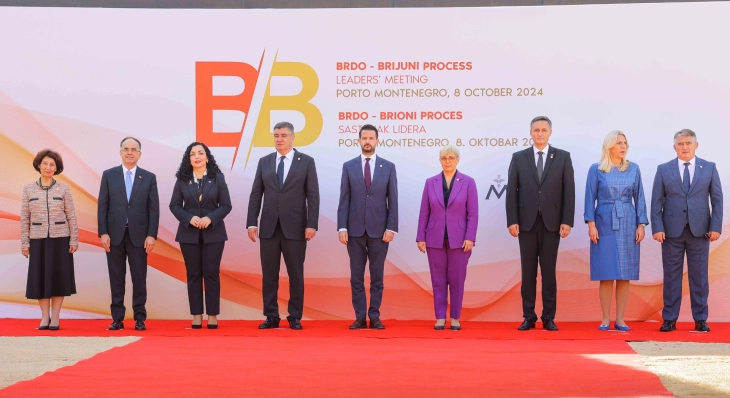Siljanovska-Davkova: Western Balkans ‘waiting room’ to empty through integration, not emigration
- President Gordana Siljanovska-Davkova addressed a plenary session Tuesday at the meeting of the leaders of the countries participating in the Brdo-Brijuni Process held in Tivat, Montenegro.
- Post By Angel Dimoski
- 16:57, 8 October, 2024

Skopje, 8 October 2024 (MIA) - President Gordana Siljanovska-Davkova addressed a plenary session Tuesday at the meeting of the leaders of the countries participating in the Brdo-Brijuni Process held in Tivat, Montenegro.
In her address, Siljanovska-Davkova touched upon the Euro-integration as a priority challenge for the countries of the region, she said there are two ways for the Western Balkans’ “EU waiting room” to become empty – through the EU integration of the countries from the region or through the emigration of young people, who, she said, “are tired of waiting for their countries to become members of the European Union, and integrate themselves in an expedited procedure, through a shortcut, often using a foreign country’s passport as well”.

This demographic threat, according to the President, is not only dangerous for the economy, but also for democracy, since, she said, “fewer citizens means increasingly less pressure on the authorities to implement European reforms, rule of law and the fight against corruption, democratic values and the respect for human rights and freedoms”.
“The Brdo-Brijuni Process should help us so that the waiting room called Western Balkans empties through the integration of the countries, and not the emigration of the citizens. The process will fulfill its goal when the last country stuck in this geopolitical region becomes a full-fledged member of the Union and when we retire the ‘Western Balkans’ jargon to history, and no later than 2030,” President Siljanovska-Davkova said in her address, according to her Office.
She underscored the necessity of equal treatment for all countries and for the progress to the EU to be a result of the implementation of European reforms and the fulfillment of criteria related to the European legislation.
“As a country committed to goodneighborliness and regional cooperation, we respect the bilateral agreements with our neighbors and expect our neighbors to respect the agreements without abusing their right to veto,” Siljanovska-Davkova said.

The President pointed to the need of regional cooperation and mutual support, in the example of the Scandinavian countries, noting that this is necessary in order to focus on the key problems of the region.
“I already mentioned the emigration of young people. To that I will add the need for infrastructural, energy and digital connection as well, this would help the region become more competitive and a broader European and global market. The European Union’s Growth Plan for the Western Balkans should be an instrument from which all countries of the region, regardless of the level of their Euro-integration process, benefit equally,” the President said.
According to Siljanovska-Davkova “the European re-integration, i.e., reunification” is incomplete without the Balkans. She said the complete integration of the Balkans within the EU would put an end to “the endless redrawing of borders and balkanization as a phenomenon”.

In a statement after the meeting, the President said it took place in a friendly atmosphere and stressed the importance of regional cooperation and assistance. Siljanovska-Davkova highlighted the key role of the initiators of the Process – Slovenia and Croatia – and voiced hope that they will continue to be vocal in the process “for our reunification or reintegration into Europe”.
At Tuesday’s summit, the heads of delegations of the countries participating in the Brdo-Brijuni Process adopted a Declaration affirming their unshakeable conviction that the EU integration of the Western Balkans is the most promising and irreplaceable path to Europe, underscoring the necessity of brave actions to ensure the long-term stability of the continent and create the conditions for young people to stay in the region and progress in just, prosperous and sustainable societies.
Photo: President Gordana Siljanovska-Davkova's Office







